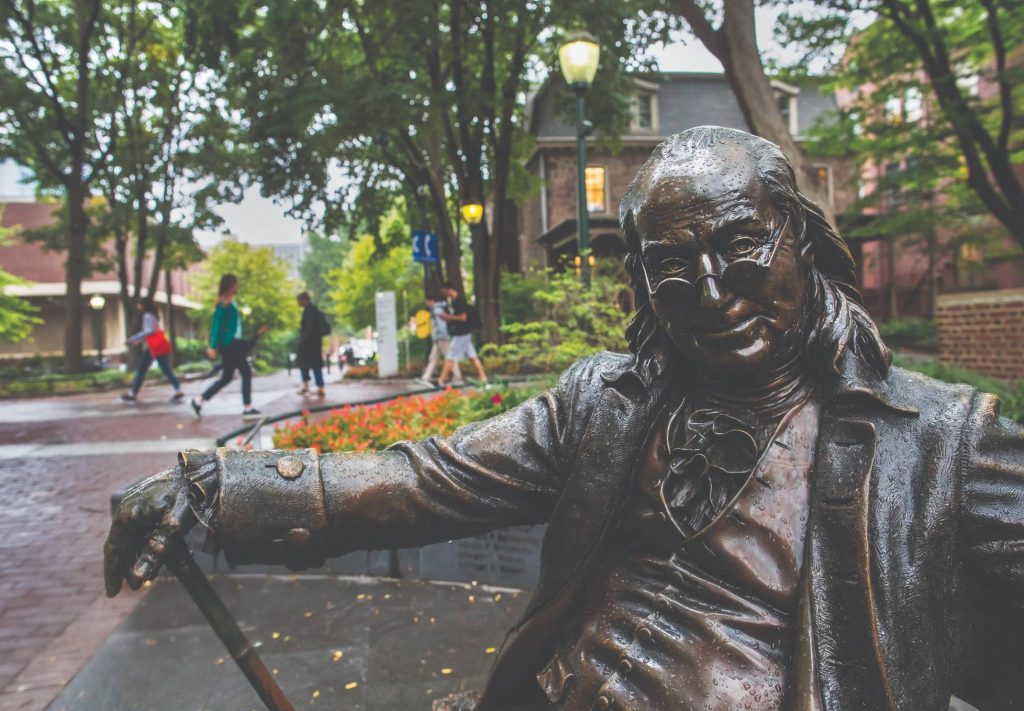University of Pennsylvania

University of Pennsylvania (Penn)
Location: 34th & Spruce St, Philadelphia, PA 19104
Website: admissions.upenn.edu
Overview
First things first: We’re the University of Pennsylvania (aka Penn), an Ivy League research university founded by Ben Franklin in the heart of Philadelphia. Penn is a place for people who want to do something big and explore diverse interests. With a culture centered on innovation, creativity, and interdisciplinary collaboration, Penn encourages students to gain and create knowledge while fostering curiosity and inspiration.
Quick Facts
Athletics Division: NCAA Division I-FCS
Athletics Conference: Ivy League
Enrollment:
Undergraduate: 10,412 (full-time), 838 (part-time)
Graduate: 6,600+
Acceptance Rate: 7%
Popular Majors: Finance, Economics, Management Sciences and Information Systems
Median Earnings (6 years after graduation): $85,900/year
Graduation Rate: 96%
Rankings
Niche Rankings:
Best Colleges for Business in America: #1 of 1,221
Best Colleges for Accounting and Finance in America: #1 of 821
Best Colleges for Criminal Justice in America: #1 of 683
See All Rankings
Admissions
Application Deadline: January 5
SAT Range: 1500-1570
ACT Range: 34-35
Application Fee: $75
SAT/ACT: Considered but not required
High School GPA: Required
Early Decision/Early Action: Yes
Common App Accepted: Yes
Admissions Website: How to Apply
Will You Get In? See your chances of getting in by signing up for a free Niche account.
Cost and Financial Aid
Net Price (average): $26,123/year
Average Total Aid Awarded: $57,175/year
Students Receiving Financial Aid: 57%
Penn meets 100% of demonstrated financial need for all admitted students, with no-loan financial aid packages.
Explore Tuition & Cost Breakdown
Academics
Student-Faculty Ratio: 5:1
Evening Degree Programs: Yes
Popular Majors:
Finance: 398 graduates
Economics: 234 graduates
Management Sciences and Information Systems: 207 graduates
Online Learning:
Mix of online and on-campus courses: 7%
Programs offered entirely online: 15
Online Certificate Programs: 9
Online Bachelor’s Programs: 6
Campus Life
Freshman Live On-Campus: 100%
Varsity Athletes: 9%
Greek Life: 50% of students participate
Polls:
51% describe campus life as “Work Hard Play Hard.”
61% rate athletics/recreation facilities as highly satisfactory.
68% highly rate performing arts facilities.
Student Organizations: Over 475 organizations, including cultural groups, sports, and professional societies.
Cultural Resource Centers: Six centers provide intercultural dialogue, interaction, and support for students, faculty, and visitors worldwide.
Student Reviews
What one word describes the typical student?
Work Hard Play Hard: 51%
Driven: 21%
Dynamic: 12%
Dining Facilities:
Highly rated by 36% of students.
Popular dining spots include Penn Dining Cafes and late-night eateries.
After College
Median Earnings (6 Years After Graduation): $85,900/year
Employment Rate (2 Years After Graduation): 91%
Confidence in Career Success: 88% of students feel confident they will find a job in their field after graduation.
Highlights
Learning at Penn: Four undergraduate schools offering unique opportunities for interdisciplinary studies.
Living at Penn: Urban campus with vibrant student life and proximity to Philadelphia’s cultural and historical attractions.
Affording Penn: Robust financial aid programs making education accessible.
Majors and Minors: Over 100 options for academic exploration.
For more information, visit University of Pennsylvania.
General Information
What is the University of Pennsylvania?
The University of Pennsylvania (Penn) is a private Ivy League research university located in Philadelphia, Pennsylvania, founded by Benjamin Franklin in 1740.What is the University of Pennsylvania known for?
Penn is known for its interdisciplinary approach, prestigious Wharton School of Business, and strong programs in law, medicine, engineering, and liberal arts.Is the University of Pennsylvania part of the Ivy League?
Yes, it is one of the eight Ivy League schools.What is Penn’s motto?
“Leges sine moribus vanae,” which means “Laws without morals are useless.”How large is Penn’s campus?
The campus spans 299 acres in the heart of Philadelphia.Is Penn the same as Penn State?
No, Penn is a private Ivy League university, while Penn State is a public state university.What is the student population at Penn?
Approximately 10,412 undergraduates and 12,000+ graduate students.What are Penn’s colors?
Red and blue.What is Penn’s mascot?
The Quaker.What is the acceptance rate at Penn?
Approximately 7%.
Admissions
What is Penn’s application deadline?
January 5 for Regular Decision and November 1 for Early Decision.What is Penn’s Early Decision policy?
Early Decision is binding, meaning students must attend if admitted.What standardized tests does Penn accept?
Penn accepts both the SAT and ACT, though they are considered optional for many programs.What is the SAT range for admitted students?
1500–1570.What is the ACT range for admitted students?
34–35.Is a high school GPA required for admission?
Yes, but Penn also considers a holistic range of factors.Does Penn accept the Common App?
Yes, Penn accepts the Common Application.Are interviews part of the admission process?
Interviews are optional but recommended when available.What is Penn’s policy on Advanced Placement (AP) credits?
Penn offers credit for AP scores of 4 or 5, depending on the subject.Can international students apply to Penn?
Yes, Penn welcomes international students and provides resources for their success.
Academics
What schools are part of Penn?
Penn has four undergraduate schools: the College of Arts and Sciences, Wharton School, School of Engineering and Applied Science, and School of Nursing.What are the most popular majors at Penn?
Finance, Economics, Management Sciences, and Information Systems.What is the student-to-faculty ratio at Penn?
5:1.Does Penn offer online courses?
Yes, Penn offers some online programs and certificates.What is the academic calendar at Penn?
Penn operates on a semester system.What is unique about Penn’s curriculum?
Penn emphasizes interdisciplinary learning, allowing students to take courses across its schools.Does Penn have study abroad programs?
Yes, Penn offers a wide range of study abroad opportunities.What is the Wharton School?
The Wharton School is Penn’s prestigious business school, offering undergraduate and graduate programs.Does Penn offer dual-degree programs?
Yes, such as the Jerome Fisher Program in Management and Technology (M&T).Are there research opportunities for undergraduates?
Yes, Penn encourages undergraduate research across disciplines.
Campus Life
What is life like on campus?
Penn offers a vibrant campus life with over 475 student organizations and active Greek life.Do freshmen live on campus?
Yes, all first-year students are required to live on campus.What housing options are available?
Penn offers traditional dorms, suites, and apartment-style housing.Is Penn’s campus safe?
Yes, Penn has a dedicated campus safety program and Penn Police.What dining options are available?
Multiple dining halls and cafes, with vegetarian and vegan options.Does Penn have Greek life?
Yes, Greek life is active, with approximately 25% of students participating.What athletic teams does Penn have?
Penn competes in NCAA Division I as part of the Ivy League.What recreational facilities are available?
State-of-the-art gyms, swimming pools, and athletic fields.Are there cultural centers on campus?
Yes, such as the Greenfield Intercultural Center and the LGBT Center.What events does Penn host?
Events include the Penn Relays, Spring Fling, and cultural festivals.
Financial Aid
Does Penn meet 100% of demonstrated financial need?
Yes, for all admitted students.Does Penn offer merit scholarships?
No, but it offers need-based aid.What is Penn’s average financial aid package?
Around $57,175 per year.Are loans included in financial aid packages?
No, Penn has a no-loan financial aid policy.Does Penn offer work-study opportunities?
Yes, work-study is available to eligible students.How do I apply for financial aid?
Submit the FAFSA, CSS Profile, and supporting documents.What is the cost of attendance at Penn?
The average net price is $26,123 per year.Does Penn offer aid for international students?
Yes, need-based aid is available for international students.Are there scholarships for veterans?
Yes, Penn participates in the Yellow Ribbon Program.What is Penn’s tuition refund policy?
Refunds are provided on a prorated basis depending on withdrawal timing.
Admissions & Academics
Can I apply to more than one undergraduate school at Penn?
No, you must apply to one undergraduate school but can take courses across all four schools.Does Penn have a test-optional policy?
Yes, SAT/ACT scores are considered but not required for most applicants.What is Penn’s Early Action policy?
Penn offers binding Early Decision, not Early Action.Does Penn offer academic support for students?
Yes, through the Weingarten Center and various departmental resources.What unique programs does Penn offer?
Programs like Penn Integrates Knowledge (PIK) Professorships and the Vagelos Scholars Program in Molecular Life Sciences.Can I transfer to Penn?
Yes, Penn accepts transfer students, with applications typically due in March.What is Penn’s policy on gap years?
Penn supports gap years, and admitted students can defer enrollment for a year.Does Penn offer pre-professional advising?
Yes, Penn offers advising for pre-law, pre-med, and other professional tracks.What types of interdisciplinary opportunities are there?
Penn encourages cross-disciplinary study through dual degrees, minors, and certificates.What is the Huntsman Program?
A dual-degree program in International Studies and Business.What languages are offered at Penn?
Over 50 languages, including Arabic, Chinese, and Swahili.Are internships available for students?
Yes, Penn has strong internship and co-op programs through Career Services.Does Penn have a cooperative education (co-op) program?
Co-ops are available, especially in engineering and business-related fields.What study abroad programs does Penn offer?
Over 100 programs in more than 50 countries.How does Penn encourage entrepreneurship?
Through programs like Penn Wharton Entrepreneurship and the Pennovation Center.Does Penn offer honors programs?
Yes, honors programs are available in various disciplines.Can I double major at Penn?
Yes, students frequently pursue double majors or minors.Are there opportunities for undergraduate teaching?
Yes, undergraduates can serve as teaching assistants in some programs.Does Penn have a summer session?
Yes, Penn offers summer courses for undergraduate and graduate students.What is the average class size at Penn?
The average class size is 25, but it varies by program.
Campus Life & Facilities
What is Penn’s housing policy for upperclassmen?
Upperclassmen can choose on-campus housing or live off-campus.What are Penn’s cultural resource centers?
Centers like La Casa Latina, Makuu, and the Pan-Asian American Community House support diversity.Is transportation available on campus?
Yes, Penn offers shuttles, bike rentals, and is accessible via public transportation.What libraries are available at Penn?
Penn has 15 libraries, including the Van Pelt-Dietrich Library.What is the Penn Park?
A 24-acre urban park with recreational fields and green spaces.Are pets allowed in Penn housing?
Pets are not allowed, except for service animals.Does Penn have performing arts facilities?
Yes, facilities like the Annenberg Center support performing arts.What recreational activities are available?
Activities include fitness classes, outdoor adventures, and intramural sports.Does Penn have a student health center?
Yes, Penn Student Health Service provides medical and mental health support.What safety measures are in place on campus?
Penn offers 24/7 security patrols, emergency call boxes, and campus safety alerts.
Financial Aid & Scholarships
What is the average debt for Penn graduates?
Penn’s no-loan policy minimizes student debt.Does Penn offer financial aid for study abroad?
Yes, financial aid packages can apply to study abroad programs.Can graduate students receive financial aid?
Yes, need- and merit-based aid is available for graduate students.Are there work-study opportunities?
Yes, work-study positions are available across campus.Does Penn offer financial literacy resources?
Yes, Penn’s financial aid office offers workshops and resources.Can international students receive scholarships?
Yes, need-based aid is available for international students.What percentage of students receive financial aid?
Approximately 57% of students receive financial aid.Are scholarships renewable?
Yes, scholarships are renewable as long as eligibility requirements are met.Does Penn offer emergency financial support?
Yes, through emergency grants and short-term loans.Does Penn charge application fees for financial aid?
No, financial aid applications do not require additional fees.
Alumni & Career Support
How strong is Penn’s alumni network?
Penn has a global network of over 300,000 alumni.What is Penn’s job placement rate?
91% of graduates are employed two years after graduation.Does Penn offer career counseling?
Yes, Career Services provides individualized support for students.Are there networking opportunities at Penn?
Yes, Penn hosts career fairs, alumni events, and industry-specific panels.What is the average starting salary for Penn graduates?
The average starting salary is $85,900 per year.Does Penn offer entrepreneurship support after graduation?
Yes, programs like Penn Wharton Entrepreneurship extend to alumni.What are notable Penn alumni?
Alumni include Elon Musk, John Legend, and Donald Trump.Does Penn help with graduate school applications?
Yes, through advising, test prep resources, and recommendation support.Are there mentorship opportunities at Penn?
Yes, through alumni-student mentorship programs.What industries do Penn graduates work in?
Graduates work in finance, technology, healthcare, education, and more.







